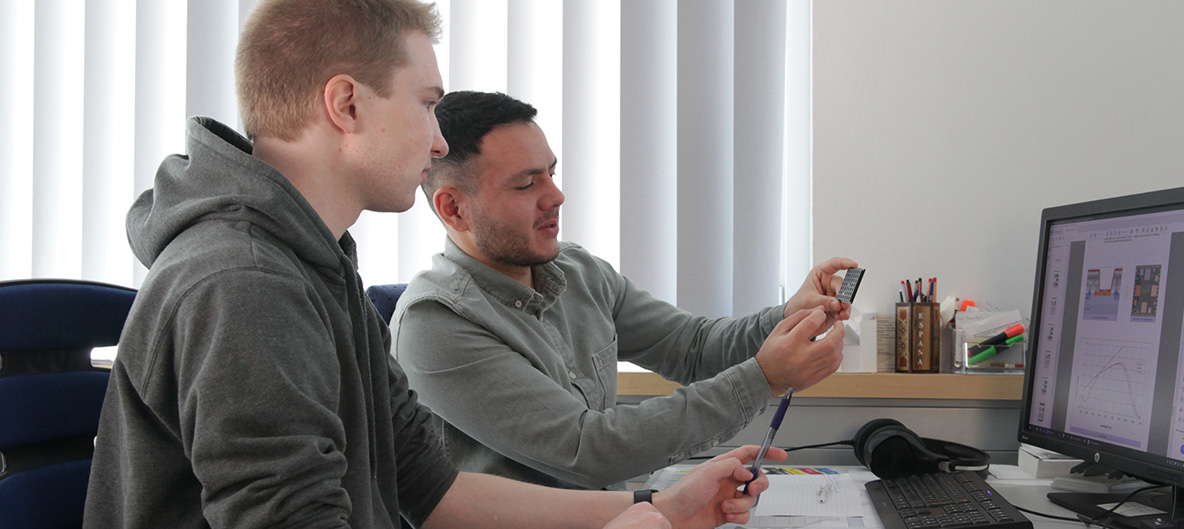

Design of a sensor analog frontend for an RFID sensor tag IC using a delta-sigma ADC
During your studies, you can contribute to our ongoing research projects. Join us in pushing the limits of what is technically feasible and be part of breaking new ground together. We offer a variety of challenging and practice-oriented topics for mandatory internships, Bachelor’s or Master’s theses or for student research assistants. You will analyse important scientific preliminary questions and support the project teams with development activities.
Place of work: Erfurt
Team: Microelectronics
Career level: Thesis
Research field: Integrated sensor systems
Time scope: By agreement
Start: As soon as possible
Application deadline: 2024-12-31
Reference number: IMMS_STUD_ME_0624
For the measurement of physical quantities, usually, analog sensors are used which provide a proportional voltage signal at the output. At the IMMS, we develop solutions for wireless operation of analog sensors by using the RFID technology. In this way, it is possible to collect measurement data from sensors in areas without electricity supply. The sensor’s supply power is taken exclusively from the electromagnetic field, so there is only a very low amount of energy (about 1µJ per measurement) available for the conversion process. To achieve this, a holistic view of the system and very good circuit design are necessary.
An analog-to-digital converter (ADC) is required to process this measurement data at system level. Depending on the requirements, there are various converter topologies that differ in parameters such as sampling rate, resolution or current consumption. The converter topology based on the delta-sigma principle offers high resolution as well as the advantage of noise shaping which shifts the interfering quantization noise to higher frequencies, thus increasing the signal-to-noise ratio. This makes the delta-sigma ADC particularly suitable for sensor signals with low to medium rates of change.
The objective of this work is to develop a sensor analog frontend for resistive bridge sensors as an integrated CMOS circuit which can be applied in a future RFID tag ASIC. The frontend is to be realized with a delta-sigma ADC. The first task will be detailed literature research, followed by a comparison of various delta-sigma ADC topologies. Afterwards, a suitable frontend architecture is to be worked out and then be implemented in 180nm CMOS technology. Finally, the work shall be compared with an existing frontend design using an SAR-ADC, regarding parameters such as accuracy and current consumption.
WHAT TO DO:
- Familiarization with the topic & literature research
- Comparison and contrast of different circuit topologies
- Selection and implementation of a suitable circuit concept in the Cadence design environment
- Circuit verification with test benches
WHAT TO BRING WITH YOU:
- advanced studies in the field of electrical engineering
- Knowledge of analog circuit technology
- motivated and self-driven way of working
AND THIS IS US:
We strengthen enterprises with application-oriented research and development in microelectronics, systems engineering and mechatronics and transfer the results of basic research into applications and products. We support companies in launching internationally successful innovations for health, the environment and industry and provide solutions from the feasibility study to series production.
WE ARE LOOKING FORWARD TO MEETING YOU!
We thank you for your interest in working with us.
WHAT CAN WE OFFER YOU:
- An attractive workplace in a modern, very well-equipped and industry-oriented research institute
- Work directly at the interface between university and industry
- Work in a flexible and creative team and on innovative and challenging topics
For the tasks described in the job offer and with the existing working conditions, an application is possible irrespective of gender and/or any physical disabilities. We foster professional equality of women and men. We invite women in particular to apply. As women are underrepresented at IMMS, they will be given priority in the case of equal suitability, ability and professional performance.
Address:
IMMS Institut für Mikroelektronik- und Mechatronik-Systeme gemeinnützige GmbH (IMMS GmbH)
Ehrenbergstraße 27
98693 Ilmenau
Germany
Contact: Eric Schäfer



 Print
Print